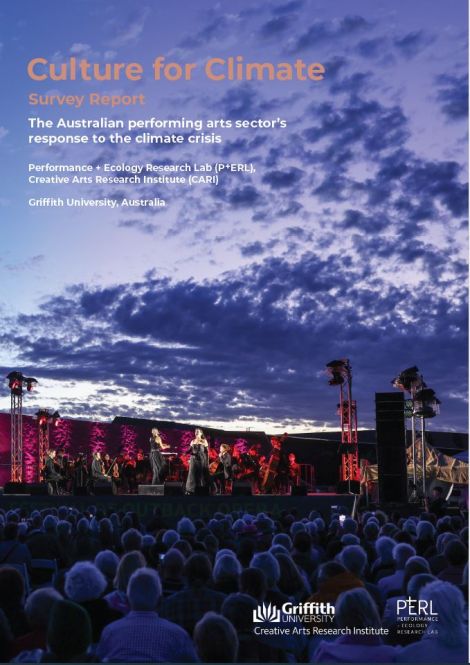The Performance+Ecology Research Lab
The Performance + Ecology Research Lab (P+ERL) is an initiative dedicated to furthering climate action across all aspects of contemporary culture-making, with the aim of building sustainable futures in and beyond the performance arts. Our work is embedded in eco-critical, eco-creative, and transdisciplinary research, investigating ideas of performance and performativity in a climate-changed world. We work closely with Griffith University’s Climate Action Beacon, which aims to develop knowledge, leadership and capacity to enable effective and just climate action.
P+ERL was established by Co-directors Dr Tanja Beer, Dr Linda Hassall, and Dr Natalie Lazaroo, with Professor Julian Meyrick as an Associate. The research lab was officially launched in March 2023 within the Creative Arts Research Institute (CARI) at Griffith University, alongside the release of the team’s Culture for Climate report — the first national investigation into how Australian performing arts organisations are addressing the challenges of climate change.
Since its inception, P+ERL has worked with the National Institute of Dramatic Art (NIDA) on a consultancy to green their curriculum. The project included developing teaching and learning resource packs to support NIDA’s sustainability efforts across all learning areas and programs by embedding sustainability initiatives and practices. NIDA is Australia’s leading performing arts school and a centre of excellence in education for theatre, film and television, and we are excited that our deliverables will help build a generation of sustainability-informed cultural leaders.
We are part of the organising committee for The Colloquium on Artistic Research in Performing Arts Conference (CARPA9, 28–30 August 2025, Helsinki, Finland): Ecological Design and Performance Pedagogies: Sustainable Practices and Interdisciplinary Acts in a Climate Changed World and the co-authors of a new monograph in development: Towards Eco-creativity: Approaches for Drama, Theatre, and Performance Design in a Climate Changed World (Beer, Hassall & Lazaroo, Palgrave Macmillan, 2026).
Our project: Culture for Climate: Harnessing Eco-Creativity to Transition Australia’s Performing Arts to Environmental Sustainability (LP230200526) recently received multiyear Linkage Project funding through the Australian Research Council. Over the next three years P+ERL will explore eco-creative sustainability strategies to accelerate meaningful climate action in and through the arts. This project will be developed with Performing Arts Centres Australia (PAC) and One Stone Advisors alongside leading cultural collaborators.
The project will be the first of its kind to develop innovative sustainability practices and policies that unlock and empower new ways of thinking and creating in a climate-changed world. It marks a significant step towards climate justice for the Australian performing arts sector and the cultural sector at large. It will also build on the results of our first National Culture for Climate Survey with partners PAC Australia, One Stone Advisors, Charcoalblue, Arts on Tour, and Theatre Green Book Australia.
Culture for Climate Launch
P⁺ERL CO-DIRECTORS
Dr Tanja Beer
Dr Tanja Beer is a Senior Lecturer in Design at Queensland College of Art and Design, Griffith University, Australia. Originally trained as a set and costume designer, her extensive career as an ecological designer, community artist and researcher builds on more than 20 years of theatre practice. Tanja’s pioneering concept of Ecoscenography has been featured in numerous programs, exhibitions, articles and platforms around the world. She is the author of Ecoscenography: An Introduction to Ecological Design for Performance (2021).
Dr Linda Hassall
Dr Linda Hassall is the Deputy Convener of the Bachelor of Arts, School Humanities, Griffith University. Her research focuses on devising and producing contemporary performance and explores the relationship between theatre and climate change. She further explores the developing of sustainable production technologies in response to theatre’s carbon footprint. Linda is the author of Theatres of Dust: Climate Gothic Analysis in contemporary Australian drama and performance landscapes (2021). She is an award-winning playwright of Post Office Rose (2008) and director of Salvation (2012).
Dr Natalie Lazaroo
Dr Natalie Lazaroo is a Lecturer in Education (Drama) at Griffith University, where her research interests lie in cultural citizenship, socially engaged performance, arts-based research, and decentring/decolonising methodologies. Natalie has received grants for her work into the arts and cultural citizenship with disadvantaged young people in Singapore, where she has been involved in a long-term and ongoing collaboration.
RESEARCH ASSOCIATES
- Sophie Barfod Dye
- Dr. Kaya Barry
- Dr. Saffron Benner
- Shaun Charles
- Angela Goh
- Willow Manton
- Kathryn Marquet
- Prof. Julian Meyrick
- Dr. Samid Suliman
- Prof. Vanessa Tomlinson
- Dr. Sarah Woodland
- Vulcana Circus
PROJECTS

Culture for Climate
A preliminary study into how Australian performing arts organisations are responding to the global environmental crisis (2021-2023).

The Flood Project
An applied theatre research project exploring the real-life testimonies of the Brisbane flood-affected Rocklea community (2023-2024).

Climate Scapes
A circus exploration of the challenges to migratory pathways in the East Asian-Australasian Flyway in collaboration with Vulcana Circus (2021-ongoing).

Littoralis - South Bank in Situ
A hypothetical student-led design for The Prague Quadrennial of Performance Design & Space PQ Studio [UN]Common Design Project 2023.
CULTURE FOR CLIMATE REPORT

The Culture for Climate Report is a preliminary study into how Australian performing arts organisations are responding to the global environmental crises through sustainability strategies, programming practices and policies.
Contact us
Contact us to find out more about CARI or to subscribe to our fortnightly e-newsletter
Acknowledgement of Country
We acknowledge the Traditional Custodians of this Country on which we live and work. We recognise their continuing connection to place and culture, and pay respects to their Elders past, present and emerging.